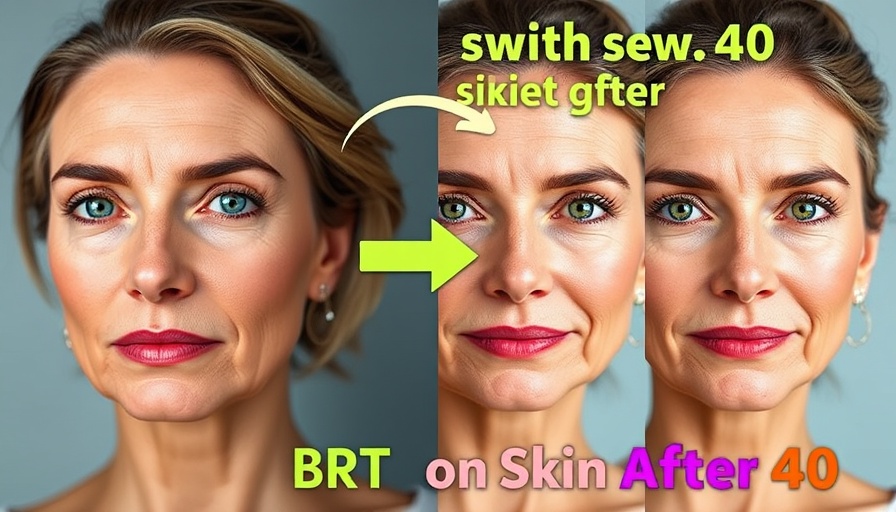
Understanding Menopause & Skin Health: What Women Need to Know
As women enter midlife, particularly during the transition of menopause, hormonal fluctuations can significantly impact skin health, from acne flare-ups to increased dryness. If you’re a woman navigating this stage of life, you may find yourself asking, "What’s happening to my skin?" The recent discussion in the video 'Menopause, Hormones and Your Skin- What you need to know!' highlights the critical connection between hormonal changes and skin transformations.
In 'Menopause, Hormones and Your Skin- What you need to know!', the discussion dives into crucial insights about hormonal changes affecting skin health, prompting us to delve deeper into actionable skincare guidance for women navigating menopause.
How Hormones Influence Skin During Menopause
According to board-certified dermatologist Dr. Brenda Deniman, hormonal fluctuations play a pivotal role in the skin's appearance and health. Many women experience changes such as increased dryness and the development of cystic acne, particularly when starting hormone replacement therapy (HRT). Dr. Deniman acknowledges that while HRT can alleviate symptoms like hot flashes and joint pain, it may also lead to unexpected skin reactions, such as acne flare-ups for some patients on progesterone.
The Role of Hormonal Balance in Skin Care
Hormones such as estrogen and progesterone directly affect skin hydration and texture. As estrogen levels decrease during menopause, many women notice that their skin loses its natural moisture, leading to dryness and a loss of elasticity. Innovative approaches, such as incorporating micronized progesterone into hormone therapy, can, in some cases, balance the skin’s oil production, which may reduce acne instances. Yet, the key lies in personalization—adjusting dosages based on individual responses can provide comfort while addressing skin concerns.
Essential Skincare Strategies for Midlife Women
Caring for aging skin requires a multi-faceted approach. Dr. Deniman suggests several skincare strategies, including: 1. **Consistent Moisturization**: Using hydrating products can help combat dryness. Look for creams rich in hyaluronic acid and glycerin. 2. **Topical Treatments for Acne**: If hormonal acne emerges, topical treatments such as retinoids may help. They are renowned for their ability to reduce acne and promote healthy skin turnover. 3. **Sun Protection**: Don't underestimate the role of sunscreen, as skin becomes more susceptible to sun damage with age. Daily application of broad-spectrum SPF is crucial.
Holistic Approaches to Skincare: Lifestyle Considerations
Dr. Deniman also emphasizes lifestyle adjustments that can enhance skin health. Diet plays a critical role in how our skin looks and feels. Adopting a balanced diet rich in antioxidants, healthy fats, and hydration is essential. Some nutrients like vitamins D and B6 have been linked to skin health, while reduction in alcohol intake can lead to a fresher, less inflamed complexion.
Understanding Common Misconceptions
A pivotal takeaway for many in midlife is to dismantle myths surrounding hormone replacement therapy. Historically, HRT has been stigmatized with fears tied to cancer risks. However, emerging research indicates that for many women, HRT can be both safe and beneficial when managed appropriately. The nuanced understanding of HRT encourages dialogue between women and their healthcare providers, allowing them to make informed decisions tailored to their unique situations.
Actionable Steps: Consult and Customize Your Skincare Routine
Ultimately, understanding and addressing skin changes during menopause necessitates a multifaceted approach. As identified in the discussion, it is essential to engage with professionals knowledgeable in the hormonal intricacies of women’s health. Seek support from skincare specialists who can tailor treatments that mitigate menopause-related skin concerns while considering your overall health context.
If you’re navigating menopause and seeking to revitalize your skincare routine, know that you’re not alone. Join the conversation and empower yourself with knowledge about hormone health and its influence on skin. Recognizing that everyone’s experience is unique, consider consulting experts who can help tailor a plan just for you.
 Add Row
Add Row  Add
Add 






Write A Comment